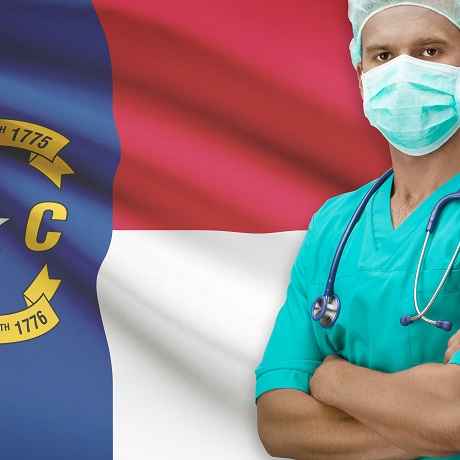 Are you a nurse working in North Carolina, or a student looking to pursue a nursing career?
Are you a nurse working in North Carolina, or a student looking to pursue a nursing career?
If so, CPR certification is a bare-minimum requirement for employers. In fact, the large majority of nursing schools in North Carolina – including the UNC Nursing School of Nursing and the University of Chapel Hill NC School of Nursing – require students to have a minimum Basic Life Support (BLS) CPR Certification.
Not only that, these universities ask that the certifications be issued by the American Heart Association (AHA) or an AHA-affiliated training center to ensure students are on the same page.
CPR Certifications for North Carolina Nurses & Healthcare Providers
The reality is that nurses and healthcare providers are held to a higher standard when it comes to CPR certification. We’ve yet to come across an employer who didn’t require nurses (CNAs, LVNs, RNs and so on) to hold basic BLS certification to gain employment.
Depending on where you’re working and/or the population you’ll serve, your employer might require CPR certification that extends beyond the BLS level as well.
Basic Life Support (BLS)
The Basic Life Support class takes the average CPR course – now required by law for North Carolina high school graduates – and extends it to a bigger-picture view that reaches into the world of medical professionals and emergency responders. In this course, nurses and other healthcare professionals will:
- Refresh their memory of single-rescuer CPR skills
- Learn tight, team-rescuer life support skills
- Be taught how to quickly assess a life-threatening emergency
- Reinforce high-quality chest compressions – what they look, feel and sound like
- Refresh their knowledge of proper AED timing and techniques, with ample opportunities to practice
- Have time for questions, answers, and group discussion, reinforcing relevant material and sharing real-life examples and scenarios
Please Click Here for a list of The Response Institute‘s upcoming BLS certification courses by date, or search our database by location.
Advanced Cardiovascular Life Support (ACLS)
 ACLS certification builds on what students learned in the BLS course, with an emphasis on cardiovascular incidences that lead to cardiac arrest.
ACLS certification builds on what students learned in the BLS course, with an emphasis on cardiovascular incidences that lead to cardiac arrest.
With heart disease being a leading cause of death in the United States, an increasing number of hospitals and healthcare providers require healthcare staff to hold an ACLS certification as well. This is particularly true for those who work in the field of cardiology, as well as nurses employed by urgent care facilities, ERs, trauma centers, and so on.
The ACLS course:
- Uses a cooperative learning model throughout the course
- Teaches how to recognize and intervene in the event of acute dysrhythmia, cardiopulmonary arrest, immediate post-cardiac arrest, acute coronary syndromes, and stroke.
- Uses simulations so participants can get instruction around, as well as practice, the differential diagnosis of pre-arrest, arrest, and post-arrest scenarios
Nurses may also be interested in the ACLS for experienced healthcare providers (ACLS EP), which goes on to highlight more complex cardiovascular and respiratory emergencies, including those associated with toxicologic or metabolic events.
You can Click Here for a list of our ACLS certification courses in date order, or search the same page for classes in a particular area.
Pediatric Advanced Live Support (PALS)
If you work in a facility that services the pediatric population, your employer may require nurses or managing nurses to hold a PALS certification.
The PALS course:
- Uses a combination of videos, instructor-led lecture and cooperative learning to dig deeper in the unique resuscitation needs of infants and children
- Provides simulations to hone students’ ability to perform accurate pediatric assessments
- Reinforces the important concepts included in a pediatric basic life support protocol. We review PALS treatment algorithms as well as high-quality resuscitation and efficient team dynamics.
Those who work infrequently with children, but who may encounter a child requiring CPR may prefer to obtain a Pediatric Advanced Emergency Assessment, Recognition and Stabilization (PEARS) certification. This certification prepares healthcare personnel to provide high-quality lifesaving interventions in the immediate moments after an event and continuing those interventions until the patient is transferred to a more advanced pediatric life support provider.
You can Click Here to review our upcoming list of PALS certification courses. Contact The Response Institute directly if you are interested in obtaining a PEARS certification or bringing PEARS courses to your medical facility.
What are HeartCode Courses?
While perusing AHA or CPR certification websites, you may have noticed the phrase HeartCode in front of the BLS, ACLS and/or PALS listings. This does not indicate a cardio-related specialty. Rather, HeartCode courses are offered in a blended learning format – combining self-directed eLearning with opportunities for hands-on practice, demonstration, and testing.
While HeartCode courses appeal to busy professionals, we’ve observed that the overall instruction is not as thorough as it is in an instructor-led course that uses collaborative and co-operative learning opportunities with professionals just like you. For this reason, we recommend taking instructor-led courses, even when you’re planning to renew.
Consider Taking Advantage of Onsite and/or CPR Certification Courses
If you’re too busy to take time out to for certification – or to re-certify – we recommend looking into corporate CPR certification options, where we bring the instruction to your place of business. This is an efficient and cost-saving way to certify groups of people, right on-site, without having to pay overtime, travel expenses, etc.
Another way to save time and money is to get combined CPR certifications. For example:
We can also help you to combine other CPR or AHA certification courses that make more sense for your nursing specialty.
Nurses Need to Renew CPR Certification Every Two-Years
 All of the American Heart Association certifications are valid for two-years, after which CPR certifications for nurses must be renewed. There are two main reasons for this.
All of the American Heart Association certifications are valid for two-years, after which CPR certifications for nurses must be renewed. There are two main reasons for this.
- First, the AHA updates their guidelines for CPR, First Aid, and lifesaving techniques on a routine basis, in alignment with the newest and most innovative research pertaining to airway breathing, chest compression data, AED statistics, and so on. Course materials are updated regularly to remain as current as possible.
- Secondly, while some healthcare professionals use their CPR skills on a routine basis, most do not. Research shows us that CPR and BLS acumen, like any language or skill set, wanes over time. Professionals can get rusty if they aren’t using their skills regularly. Your certification renewal courses refresh details that may have been lost over the past two-years, ensuring the information, skills, and techniques are as fresh as possible if/when you need these valuable lifesaving skills on the job.
Contact The Response Institute to Schedule CPR to Keep Your License Current
Nurses in North Carolina are in luck when it comes to obtaining a new, initial CPR certification and/or renewing the one you have. The Response Institute and CPR Consultants empower responders from all walks of life for emergency response readiness and safety training. Each of our instructors averages more than 15-years of clinical experience and training, which is why we’re one of North Carolina healthcare providers’ go-to resource for CPR and AED/First Aid certifications at every level
Contact us to learn more about our course offerings and don’t forget to ask us about how easy it is for our trainers to bring the CPR certification coursework and materials to you. We’re ready to help you save a life.
Sign up for a CPR Class Today!
